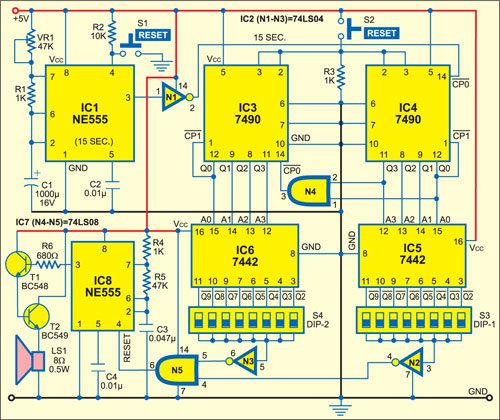 This geyser timer circuit sounds an alarm after the set timing of 22 minutes when the water is heated up.
This geyser timer circuit sounds an alarm after the set timing of 22 minutes when the water is heated up.
Geyser timer circuit
The circuit comprises a timer IC 555 wired as an astable multivibrator with adjustable time period of 15 seconds. The astable output after inversion by an inverter drives decade counters IC3 and IC4 (each IC 7490) connected in cascade. The decade counters output is connected to decoders IC5 and IC6 (each IC 7442), respectively. The decoder outputs (Q8 outputs of IC5 and IC6) are fed to inverters and the inverter outputs, in turn, are fed to an AND gate. The AND output is connected to the reset pin of the astable multivibrator built around another timer IC 555 to sound the alarm. Now you can turn off the geyser.
A green LED (LED1) has been used as the power supply indicator.
Switch on the timer and the geyser at the same time. When the alarm sounds, it means that the water in the geyser has heated up and can be used.

Construction & testing
You can assemble the timer circuit on a general-purpose PCB and install it near your bathroom so that both the timer circuit and the geyser can be switched on simultaneously.
After the siren sounds, if required, we can increase the time by another 22 minutes for geyser by resetting the circuit by pushing reset switches S1 and S2 momentarily.
If you want to change the preset time of the geyser, the same can be easily done by combining appropriate outputs of IC5 and IC6 using DIP switches (S3 and S4) while keeping in mind IC5 outputs (Q0 through Q9) are spaced 15 seconds apart and IC6 outputs are spaced 150 seconds (2.5 minutes) apart.
Caution
Please note that the timer circuit has no connection with the geyser circuit. The geyser works off 220V AC, while the timer works off 5V DC.
The article was first published in August 2005 and has recently been updated.







Sir want the connections with geyser circuit